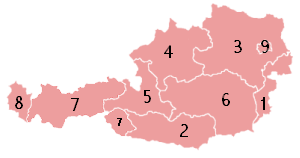|
Background
The German name Österreich can be translated into English as the "eastern realm". Reich can also mean "empire," and this connotation is the one that is understood in the context of the Austrian/Austro-Hungarian Empire, Holy Roman Empire, although not in the context of the modern Republic of Österreich.
The current official designation is the Republic of Austria (Republik Österreich). During the period of monarchy, Austria was known as the Austrian Empire (Kaisertum Österreich) ; however no official designation existed since the empire was strongly multiethnic. After the Austro-Hungarian Compromise of 1867, the empire became known as Austria-Hungary reflecting the dual monarchy character.
Politics
The Parliament of Austria is located in Vienna, the nation's largest city and capital. Austria became a federal, parliamentarian, democratic republic through the Federal Constitution of 1920. It was reintroduced in 1945 to the nine states of the Federal Republic. The head of state is the Federal President, who is directly elected by popular vote. The chairman of the Federal Government is the Federal Chancellor, who is appointed by the president. The government can be removed from office by either a presidential decree or by vote of no confidencein the lower chamber of parliament, the Nationalrat.
The Parliament of Austria consists of two chambers. The composition of the Nationalrat is determined every five years by a general election in which every citizen over 16 years (since 2007) is allowed to vote to fill its 183 seats. A recent extension of that term from four to five years will become effective after the next election. While there is a general threshold of 4 percent for all parties at federal elections (Nationalratswahlen) , there remains the possibility to gain a direct seat, or Direktmandat, in one of the 43 regional election districts. The Nationalrat is the dominant chamber in the formation of legislation in Austria.
International relations
The 1955 Austrian State Treaty ended the occupation of Austria following World War II and recognized Austria as an independent and sovereign state. In October 1955, the Federal Assembly passed a constitutional law in which "Austria declares of her own free will her perpetual neutrality." The second section of this law stated that "in all future times Austria will not join any military alliances and will not permit the establishment of any foreign military bases on her territory." Since then, Austria has shaped its foreign policy on the basis of neutrality.
Austria began to reassess its definition of neutrality following the fall of the Soviet Union, granting overflight rights for the UN-sanctioned action against Iraq in 1991, and, since 1995, contemplating participation in the EU's evolving security structure. Also in 1995, it joined the Partnership for Peace and subsequently participated in peacekeeping missions in Bosnia.
Austria attaches great importance to participation in the Organisation for Economic Co-operation and Development and other international economic organizations, and it has played
States of Austria
As a federal republic, Austria is divided into nine states. These states are then divided into districts and cities). Districts are subdivided into municipalities. Cities have the competencies otherwise granted to both districts and municipalities. The states are not mere administrative divisions but have some distinct legislative authority separate from the federal government.
 |
|
State (Bundesland) |
Capital |
Population |
Rank |
|
| Burgenland |
Eisenstadt |
280,350 |
9 |
| Carinthia Kärnten |
Klagenfurt |
560,753 |
6 |
| Lower AustriaNiederösterreich |
St. Pölten |
1,588,545 |
2 |
| Upper Austria Oberösterreich |
Linz |
1,405,986 |
3 |
| Salzburg |
Salzburg |
529,085 |
7 |
| Styria Steiermark |
Graz |
1,203,986 |
4 |
| Tyrol Tirol |
Innsbruck |
698,472 |
5 |
| Vorarlberg |
Bregenz |
364,611 |
8 |
| Vienna Wien |
Vienna Wien |
1,660,534 |
1 |
Economic overview
Austria is one of the 10 richest countries in the world in terms of GDP per capita, has a well-developed social market economy, and a very high standard of living. Until the 1980s, many of Austria's largest industry firms were nationalised; in recent years, however, privatisation has reduced state holdings to a level comparable to other European economies. Labour movements are particularly strong in Austria and have large influence on labour politics. Next to a highly-developed industry, international tourism is the most important part of the national economy.
Germany has historically been the main trading partner of Austria, making it vulnerable to rapid changes in the German economy But since Austria became a member state of the European Union it has gained closer ties to other European Union economies, reducing its economic dependence on Germany. In addition, membership in the EU has drawn an influx of foreign investors attracted by Austria's access to the single European market and proximity to EU aspiring economies. Growth in GDP accelerated in recent years and reached 3.3% in 2006.
|